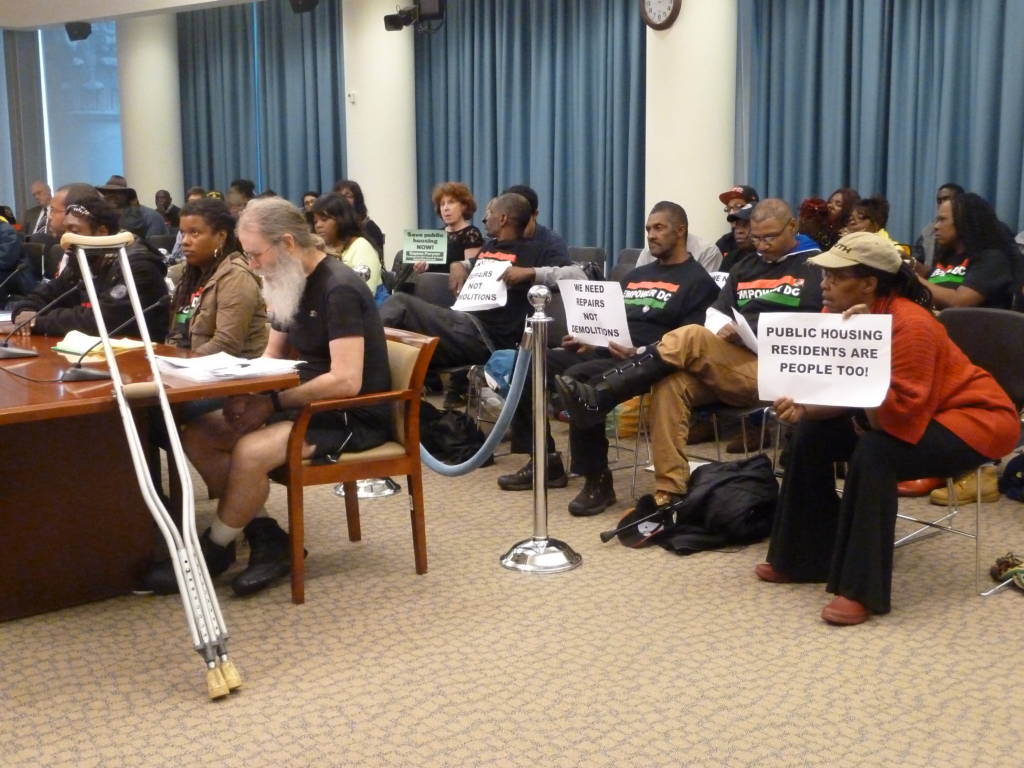An April 30 “Rally to Save Public Housing” had to be moved indoors due to inclement weather. But the pouring rain did not dampen the passion of the speakers who urged the DC Council to fund repairs of vacant units, house homeless families and improve living conditions for public housing residents.
“Housing is a human right,” declared Reverend Graylan Hagler, a housing advocate and senior minister at the city’s Plymouth Congregational United Church of Christ, speaking to other advocates who gathered at the John A. Wilson Building for the rally.
He spoke as city officials converged for a hearing on the city’s housing authority budget for the coming fiscal year. The hearing highlighted ongoing pressures affecting the operation of the DC Housing Authority, as well as the lives of public housing tenants and people waiting for affordable units.
The city’s proposed FY15 spending plan includes $145 million in local dollars for a range of affordable housing programs, an increase of 12 percent over the current year’s approved budget according to an analysis by the DC Fiscal Policy Institute. The budget includes $4 million in new spending expected to create 350 affordable homes through the Local Rent Supplement Program and $4.7 million in new local funds to help end chronic homelessness among veterans through a permanent supportive housing program. The budget also dedicates $40 million in tax revenues to the city’s Housing Production Trust Fund.
A total of nearly $43 million is earmarked for the District of Columbia Housing Authority (DCHA) Local Subsidy. DCHA is an independent public agency that owns and operates about 8,000 public housing units throughout the District.
The city subsidy for the coming year represents a $1 million net reduction when adjusted for inflation, according to the DC Fiscal Policy Institute analysis. At the same time, DCHA , like housing agencies across the country, is coping with reduced federal funding.
“We’re coming to some walls not with lenders but with the (U.S) Department of Housing and Urban Development,” said DCHA Executive Director Adrianne Todman.
In any given year, DCHA receives in federal funding only 83 to 86 percent of what is needed to maintain residential properties, DCHA officials said in a presentation at the hearing.
Nationwide, they said “public housing is home to 1.2 million households nationwide but has a total of $26 billion in deferred maintenance.”
Deteriorating conditions are making life difficult for families, some tenants testified. Others spoke of the importance of maintaining and expanding public housing opportunities.
Urban renewal and gentrification have sharply reduced the number of public housing units in recent years, advocates pointed out.
The estimated wait for a one-bedroom apartment unit is 38 years, housing officials acknowledged in budget documents. The budget hearing was chaired by City Councilwoman Muriel Bowser, who heads the council’s committee on economic development and peppered Todman with questions about problems at the housing authority.
“For a very long time we have not looked at public housing as an asset,” Todman responded.
Volunteer Rhiannon Buehler and vendor and reporter Reggie Black contributed to this report.








